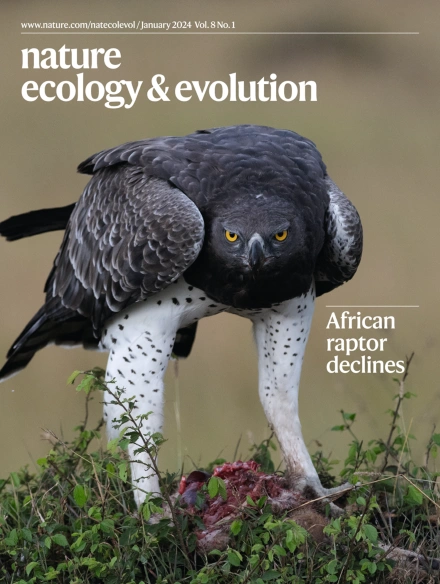EdgeHOG: a method for fine-grained ancestral gene order inference at large scale
IF 13.9
1区 生物学
Q1 ECOLOGY
引用次数: 0
Abstract
Ancestral genomes are essential for studying the diversification of life from the last universal common ancestor to modern organisms. Methods have been proposed to infer ancestral gene order, but they lack scalability, limiting the depth to which gene neighbourhood evolution can be traced back. Here we introduce edgeHOG, a tool designed for accurate ancestral gene order inference with linear time complexity. We validated edgeHOG on various benchmarks and applied it to the entire OMA orthology database, encompassing 2,845 extant genomes across all domains of life. We reconstructed ancestral gene order for 1,133 ancestral genomes, including ancestral contigs for the last common ancestor of eukaryotes, dating back around 1.8 billion years, and observed significant functional association among neighbouring genes. EdgeHOG also dates gene adjacencies, allowing the detection of both conserved gene clusters and chromosomal rearrangements. A new method to reconstruct ancestral genomes is used to estimate contigs of the last common ancestor of eukaryotes and to infer features such as the age of gene adjacencies and chromosome rearrangements.


EdgeHOG:一种大规模细粒度祖先基因顺序推断方法。
祖先基因组对于研究从最后的普遍共同祖先到现代生物的生命多样化至关重要。人们提出了一些推断祖先基因顺序的方法,但这些方法缺乏可扩展性,限制了基因邻近进化的追溯深度。在这里,我们介绍了edgeHOG,一个用于精确推断具有线性时间复杂度的祖先基因顺序的工具。我们在各种基准上验证了edgeHOG,并将其应用于整个OMA正形学数据库,该数据库包含了所有生命领域的2,845个现存基因组。我们重建了1133个祖先基因组的祖先基因序列,其中包括18亿年前真核生物最后共同祖先的祖先序列,并观察到邻近基因之间存在显著的功能关联。EdgeHOG还可以测定基因邻接关系,从而检测到保守的基因簇和染色体重排。
本文章由计算机程序翻译,如有差异,请以英文原文为准。
求助全文
约1分钟内获得全文
求助全文
来源期刊

Nature ecology & evolution
Agricultural and Biological Sciences-Ecology, Evolution, Behavior and Systematics
CiteScore
22.20
自引率
2.40%
发文量
282
期刊介绍:
Nature Ecology & Evolution is interested in the full spectrum of ecological and evolutionary biology, encompassing approaches at the molecular, organismal, population, community and ecosystem levels, as well as relevant parts of the social sciences. Nature Ecology & Evolution provides a place where all researchers and policymakers interested in all aspects of life's diversity can come together to learn about the most accomplished and significant advances in the field and to discuss topical issues. An online-only monthly journal, our broad scope ensures that the research published reaches the widest possible audience of scientists.
 求助内容:
求助内容: 应助结果提醒方式:
应助结果提醒方式:


